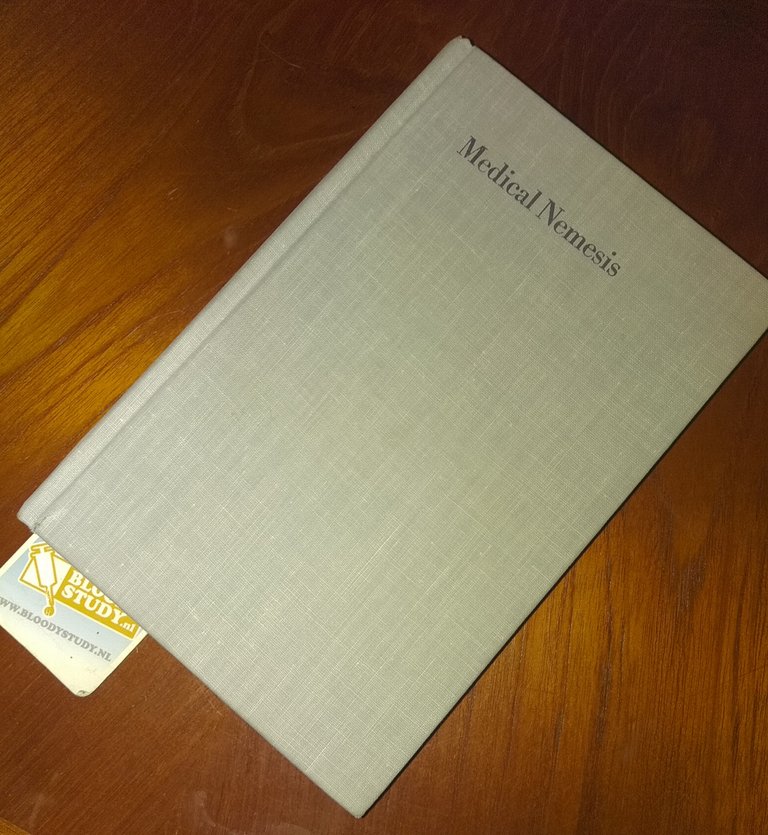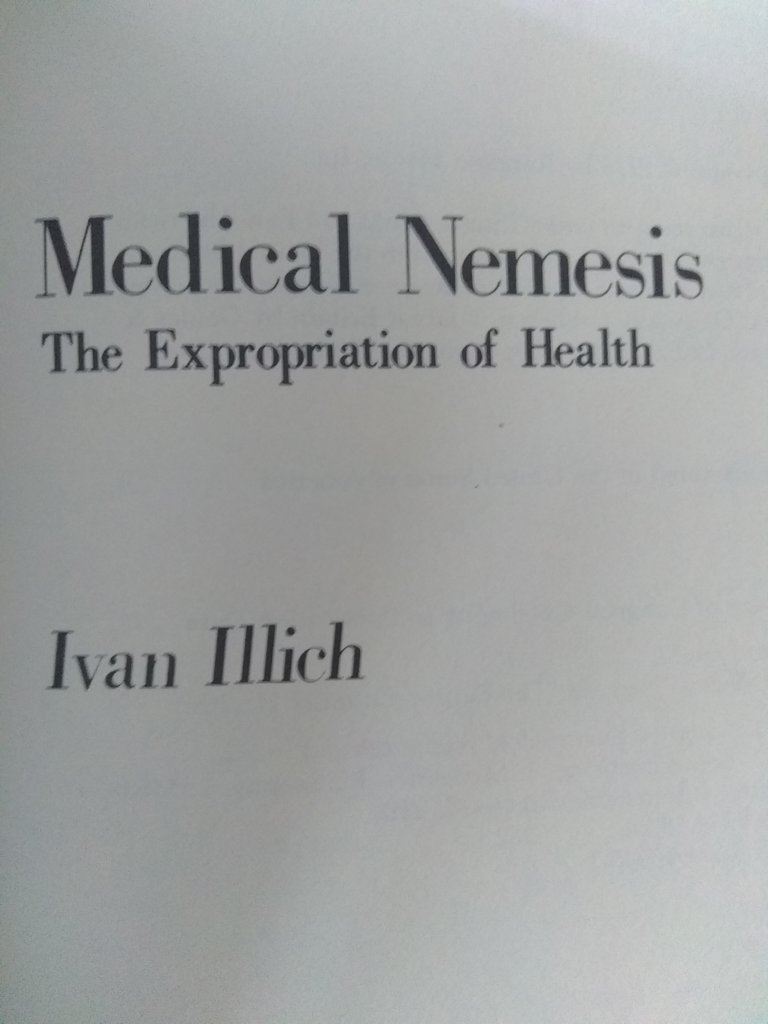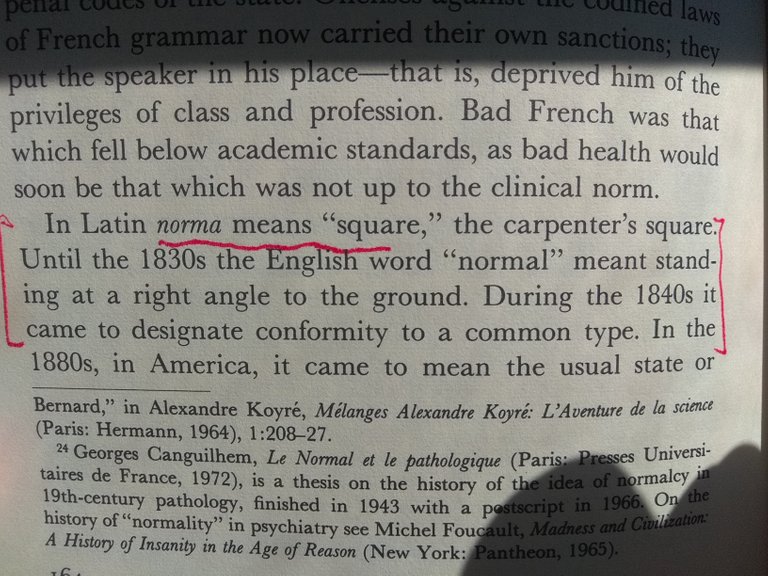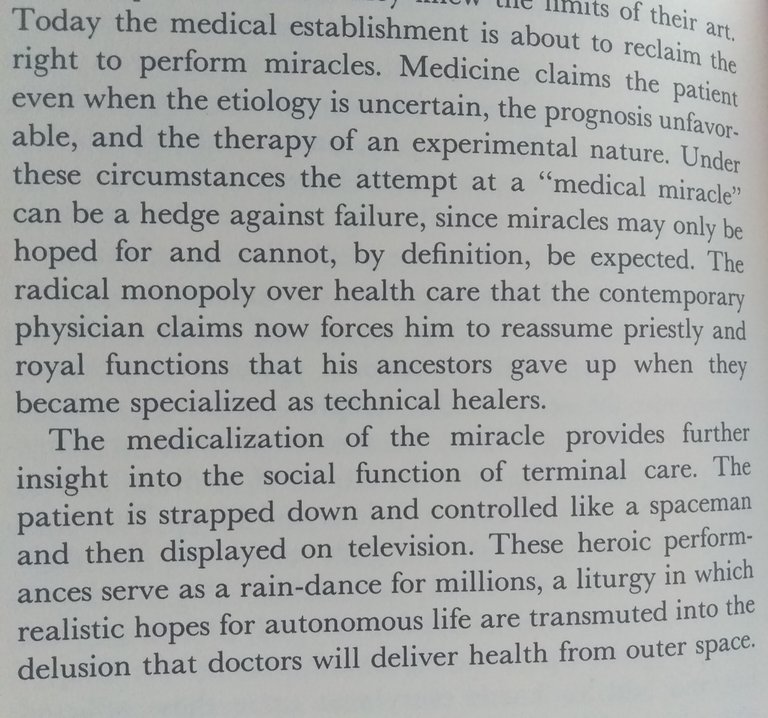Medical Nemesis: a book review
The author proposes the "Medical Nemesis" as a metaphysical result of Medical Hubris. I think most sane people accept that medicine has over stepped its original intent. Every aspect of our existence is now under medical or state scrutiny. This is not natural. This is not right.

Medical Nemesis; The Expropriation of health, Ivan Illich, New York, 1976*
The book provides a very sober and rather pessimistic analysis of the sickening effects of "medicine". This later effect is know as "Iatrogenic sickness", which means in Greek roughly "healer created sickness". The best thing about the book is that it does not fall in the trap of becoming " anti medicine", but instead frames the problem of health in a wider network of society. The author wrote a similar analysis on public transport and it shows: there is a very clear line of thought that gets explored and despite some asides and tonnes of footnotes, Ivan Illich never lets himself or the reader get bogged down in frivolous details. The book draws from a rich liberary of sources ranging from ancient philosophy to, at the moment of writing, still unpublished scientific texts. These source materials provide a background and depth that I find so dearly lacking in most "pop science" touted in the main stream media. It gives the reader many opportunities to further research certain topics, but the author clearly explains every tidbit of information, never using them as mere filling or "appeal to authority".
The books is quite dense, but a pleasant read nonetheless. This is the direct result of, I presume, some rigorous editting.

three levels of Iatrogenesis
The author defines three levels of iatrogenesis, in increasing order from micro to macro. The first level is Clinical Iatrogenesis, not just what we in day to day life call iatrogenic ( for instance: a surgical complication, medical mistake, etc) but also "when organic coping capacity is replaced by heteronomous management". This rightfully classifies as iatrogenic any medical intervention that does not directly benefits the patient, but instead makes them dependent on further interventions and takes away control and experience from them. This a profound statement and is a critique on "modern medicine" (this happend,on a lesser scale, in the past thousand year, but became the modus operandi of our current systems. Still, it feels a bit tenuous to call it " modern").
The next level up is social iatrogenesis "in which the environment is deprived of those conditions that endow individuals, families and neighborhoods with control over their own internal states". This amplifies the clinical iatrogenesis and makes shifting from it harder and harder as time progresses.
The final level is cultural iatrogenesis,which "sets in when the medical enterprise saps the will of people to suffer their reality." It then when medicine becomes the new religion, the opium of the people: it takes away peoples control over their own lives and experience in exchange for the promise of the abolishment of all suffering. This means the alienation of health as something nature gives you and you have to cherish, into a commodity that is for sale under the monopoly of the medical profession. It has created a fictional state of "health", of which the definition, the ways to obtain it can be changed by the profession on a whim.
It also places "patient" outside of "normal" society. By categorising and defining, the process gives and takes rights and duties to certain people and infringes their autonomy.

Highlights not mine,got this second hand
the killing of pain
Exactly the same argument is mad about "pain". Suffering used to indivisible: both mental and physical ( and one could possibly add "spiritual") pain were part of life, religion; existence. After the enlightenment physical pain became a nuisance; something to be resolved with a technical solution like medication, no longer part of a struggle to overcome. We are now witnessing the same development for mental discomfort; tablets, therapies all treat our ailments as minor technical problems, not as opportunities for betterment. We went from cure to treatment.
the invention and elimination of disease
Before the medical profession could claim authority over the domain of "disease", this domain had to be discovered, or rather invented. As the idea of a "mechanical" body emerged, the idea arose that faulty function of a body was a mechanical problem that required a mechanical solution. Later this shifted further by deeming every variation from the average as pathological. The most shocking thing I learned was that till about 1830 "normal" meant in an acute angle with the ground! And a "norm" was something to measure angles with. This development is the perfect analogy for the philosophical corruption of health care; the living experience reduced to stringent, unbending measurement!
The same argument is made about death and dying. At first it was a curse or punishment, now it has become a technical problem that needs to be forestalled by any technical means available.

counterproductivity
The centralisation takes away the autonomy and self reliance of the people and replaces it with a bureacratic system. Furthermore more this system is guided by industrial markers of efficiency, not by the true needs or added value to peoples life. So both on an individual as well as on the abstract level, it removes health from the person and makes it a product of which the price, distribution and ussage becomes controlled by bureaucracts.

the recovery of health
The last chapter does not gives a roadmap for the solution that Illich has mentioned multiple times: we need low tech, low coat care from our closest networks and rarely specialised care or treatment. Instead of the expected utopian vision I thought I would find here, Illich summarizes and shows what will happen if nothing changes. Sad to see his predictions come true
About the author:
Ivan Illich, Croatian Jewish Vienna born anarcho Catholic who studied theology, philosophy, history and natural sciences.
That kind of sums up his biography. Imagine a guy that reads and speaks 5 or more languages, was discharged from his priesthood in New York for being critical of the Pope and moved to Mexico and produced several seminal books on the ills of modernity.
This is this first book I read by him, mainly because of the provocative title and the fact I work in and studied health care. Writers like Illich are rare; the can dazzle without intimidating you and go of topic without losing the spirit of the argument. He is extremely knowledgeable, but fully understands that this does have any value if the reader doesn't understand him.
My thoughts on Medical Nemesis
Recently, @wwf, posted his views on medical establishment, you can find the post [here.] (https://steempeak.com/ungrip/@wwf/my-relationship-with-the-state-sponsored-medical-system). I understand the sentiment, but think the total message is slightly one sided: organised health care is bad, the public is the powerless victim.
I think Illich highlights a very important problem: both the providers and the consumer-patients are naïve: they believe more healthcare will create health, but at the same time are calculating: they want to get as much from the system as they can get!
This creates an insane state of schizophrenic double think: the health system is there to help, but it should be manipulated to yield the "highest output". The truth is that we need less. Less harmful societies, less harmful behaviour and yes, less, not more "health care". The central point that Illich makes and I completely agree with is, in my opinion; ** if you cede the responsibility for something to "higher authority", you lose the right**
It is an almost religious entitlement people feel towards health by proxy of health care. It is the illusion that somewhere, someone holds the perfect cost effective solution to your suffering and problems. That is an illusion. The only person that can guarantee your health, is you.
Quite shockingly these ideas largely coincides with what I picked up in medical school: to be wary of medicalization, that is the encroachment of organised medicine on all of life, to be sceptical of interventions and especially distrust new "wonder drugs". My professors warned me about pointless testing and screening and told me old cures worked best.
I can see that the "progress" of medicine has cost people their autonomy, their chances for personal experience and growth, but most importantly their health.

steem on, dream on!
♨️
What are your thoughts on health care and medicine?
Thank you vander! You've just received an upvote of 30% by artturtle!
Learn how I will upvote each and every one of your posts
Please come visit me to see my daily report detailing my current upvote power and how much I'm currently upvoting.
It's amazing what a generation can do, no? 1975 is actually more than a generation ago.... Medicalization IS something to be disturbed about and remains a social 'norm', and yet the growing movement to natural health and wellness surely counterbalances and gives incredible hope. You might enjoy checking out the @naturalmedicine community.
Leading the curation trail for both @ecotrain & @eco-alex.
Together We’re Making This World A Better Place.
Click Here To Join the manually curated trail "@artemislives" to support quality eco-green content.
@ecoTrain